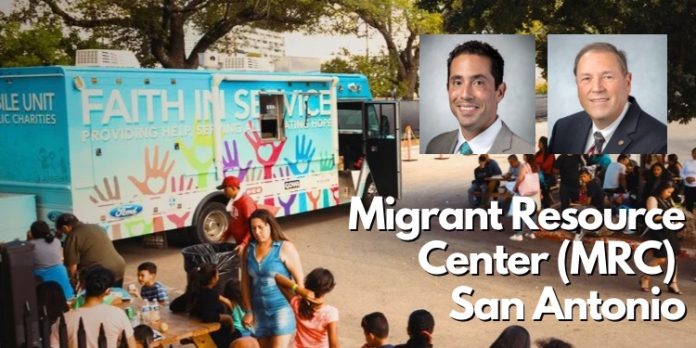San Antonio Accepts $21.8 Million for Migrant Services Amid Council Debate- Why did 2 Councilpersons Vote NO?
On Thursday, the San Antonio City Council voted to accept nearly $21.8 million in federal funding to continue supporting migrants traveling through the city. This decision, part of FEMA’s Shelter and Services Program, aims to alleviate the financial burden on local taxpayers and ensure the ongoing operation of the Migrant Resource Center (MRC). Although the city initially requested $58.5 million, the approval of the lesser amount was seen as a significant win. However, the decision was not without controversy and dissent from two council members.
The council meeting saw overwhelming support for the funding, but District 10 Councilman Marc Whyte and Councilman John Courage stood in opposition. Their resistance was rooted in a broader critique of federal immigration policy and the inefficiencies they believe it perpetuates. “I believe that by supporting this item, we are promoting a failure of our federal government,” Whyte stated. He argued that accepting the funds would allow the federal government to shirk its responsibilities, ultimately leaving San Antonio to bear the financial burden of a flawed immigration system.
Councilman Courage echoed Whyte’s concerns, stressing the need for comprehensive immigration reform. “I think it’s up to us to continue to operate the MRC until such time as a better management operation is put forward by the U.S. government,” he said. Courage’s stance highlights a frustration with the federal government’s handling of immigration issues and a belief that local acceptance of federal funds does not address the root causes of the problem. But, is Washington even listening to 2 community councilpersons? The message will not be received this way as there are plenty of other messages they can send. San Antonio Taxpayers would foot the bill before Washington stepped in. It is a tone deaf vote as residents enter CPS pay plans, SAWS pay plans, try to buy groceries day to day and 2 councilpersons want to make it harder? Why is the question.
Their opposition came despite strong arguments from other council members about the immediate financial relief the funds would provide. District 8 Councilman Manny Pelaez emphasized the practical benefits of accepting the funds. “This is really simple: If we don’t vote yes on this today, then that federal money isn’t used to compensate us for the costs that we’ve already paid,” he explained. Councilwoman Adrianna Rocha-Garcia from District 4 shared this sentiment, pointing out that rejecting the funds would unfairly burden local taxpayers.
The debate also touched on broader social issues. Jalen McKee-Rodriguez, the council member for District 2, suggested that some of the opposition might be rooted in “anti-immigrant sentiment,” highlighting the complex and often contentious nature of immigration discussions.
Mayor Ron Nirenberg defended the decision to accept the funds, underscoring the vital role of the Migrant Resource Center in maintaining public order and safety. “We can protect public safety, and we can treat people with basic dignity and compassion at the same time,” he said. The MRC, which serviced an average of 6,316 migrants per month from January through April this year, plays a crucial role in managing the flow of migrants through the city.
Despite the council’s overall support for the funding, the debate revealed deep divisions about how best to handle the intersection of local responsibilities and federal immigration policies. Whyte and Courage’s stance reflects a broader discontent with federal inaction and a desire to push for systemic change, which can be done in other ways then not taking federal funds and putting it on the backs of your constituents income.
While the acceptance of $21.8 million in federal funding represents a practical step towards alleviating San Antonio’s financial burden, the dissenting votes from Whyte and Courage highlight a significant debate over the role of local versus federal responsibility in addressing immigration issues. Yes immigration reform is needed but it is not the responsibility of the San Antonio Community and their paychecks to cover or relieve the city from this federal issue.






